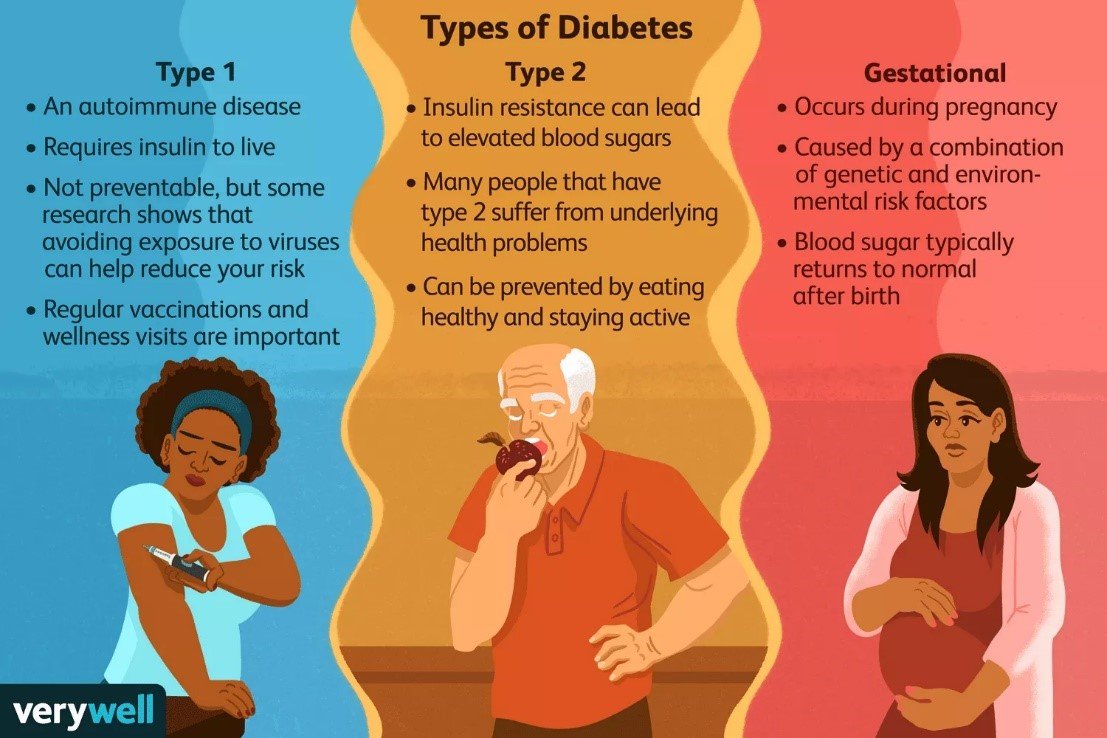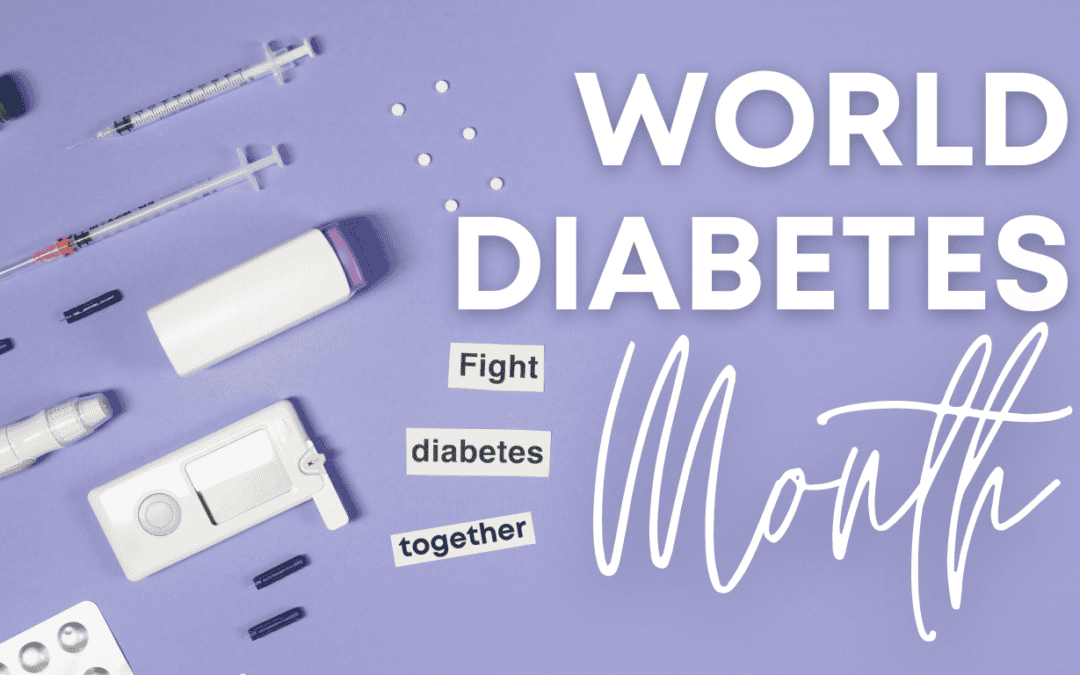
November is Diabetes Awareness Month, a time to spread knowledge about diabetes, its effects, and the latest research (National Institute of Diabetes and Digestive and Kidney Diseases [NIDDK], 2023). Diabetes is a long-term health condition that affects how the body converts food into energy (NIDDK, 2023). When we eat, our bodies break down carbohydrates into glucose, a type of sugar that enters the bloodstream. The pancreas makes insulin, a hormone that helps glucose be used for energy (NIDDK, 2023). In people with diabetes, this process doesn’t work properly (NIDDK, 2023). There are three main types of diabetes: type 1, type 2, and gestational diabetes (NIDDK, 2023).

- Type 1 diabetes is an autoimmune condition in which the immune system attacks and destroys the cells in the pancreas that make insulin. Without insulin, blood sugar levels get too high (NIDDK, 2023).
- Type 2 diabetes: The most common type of diabetes, where the body either resists the effects of insulin or doesn’t make enough. This also results in high blood sugar levels (NIDDK, 2023).
- Gestational diabetes: This type develops during pregnancy and usually goes away after childbirth but increases the risk of developing type 2 diabetes later in life (NIDDK, 2023).
Genetic Factors in Prediabetes
Prediabetes is a condition where blood sugar levels are higher than normal but not high enough to be considered diabetes. It raises the risk of developing type 2 diabetes. A study by Li et al. (2024) identified six genetic subtypes of prediabetes, each with different characteristics and risks for progressing to type 2 diabetes (T2D).
- Beta-cell Dysfunction Predominant: This subtype is marked by poor function of the insulin-producing cells in the pancreas, along with traits linked to obesity and fat storage in the liver (Li et al., 2024).
- Proinsulin Predominant: People in this group have high levels of proinsulin (an insulin precursor), suggesting inefficient insulin processing (Li et al., 2024).
- Obesity Predominant: This subtype shows a strong genetic predisposition to obesity, which is a major risk factor for T2D (Li et al., 2024).
- Lipodystrophy Predominant: This group has abnormal fat distribution, which can lead to insulin resistance (Li et al., 2024).
- Liver/Lipid Metabolism Predominant: This subtype involves issues with liver function and fat metabolism, which can impact blood sugar levels (Li et al., 2024).
- Severe Insulin Deficiency: People in this group have extremely low insulin production, putting them at the highest risk for developing T2D (Li et al., 2024).
The study found that people with certain genetic profiles had a higher risk of developing diabetes, even if their starting blood sugar levels were similar to others (Li et al., 2024). Importantly, those with higher genetic risk benefited more from lifestyle changes, such as a healthy diet and regular exercise (Li et al., 2024). This research emphasizes the potential for personalized medicine in diabetes prevention, where interventions are tailored based on genetic risk. (Li et al., 2024). Further studies are needed to confirm these findings and explore the underlying biological mechanisms (Li et al., 2024).
Gut Health and Diabetes
A forum summarized by Byndloss et al. (2024) discussed the role of gut bacteria in diabetes. The bacteria in our gut help with digestion and can affect how our body handles sugar and insulin (Byndloss et al., 2024). Scientists are exploring how gut bacteria could play a role in developing diabetes and how this research could lead to new treatments (Byndloss et al., 2024). However, the unique nature of each person’s gut bacteria makes this research complicated, requiring larger studies and better technology (Byndloss et al., 2024).

Fitness and Diabetes
Research by Ramos et al. (2024) looked at how fitness and the function of mitochondria (the energy producers in our cells) affect walking speed in older adults with diabetes. The researchers found that people with diabetes often have lower fitness levels and mitochondria that don’t work as well (Ramos et al., 2024). This affects their ability to walk quickly, which is important for staying independent as we age (Ramos et al., 2024). The study showed that fitness and good mitochondrial function explain 20-70% of the differences in walking speed between older adults with and without diabetes (Ramos et al., 2024). This highlights the need for targeted exercise programs to help people with diabetes maintain their mobility (Ramos et al., 2024).
Social Factors and Diabetes
A study by Hill-Briggs et al. (2021) points out the important role of social factors, also known as social determinants of health, in the development and outcomes of diabetes. Social factors include things like income, education, and where someone lives. People with lower incomes often have less access to healthcare, healthy food, and safe places to exercise, which raises their risk of diabetes (Hill-Briggs et al., 2021). Neighborhoods without parks or grocery stores with healthy food make it harder for people to live a healthy lifestyle (Hill-Briggs et al., 2021). Access to healthcare is also critical, but barriers like the cost of care or long distances to doctors can prevent people from getting the help they need (Hill-Briggs et al., 2021).
The study also found that community programs and policy changes can help improve diabetes care. These programs focus on making healthcare more accessible and providing better support for healthy lifestyles. Policy changes aimed at addressing bigger social problems are also needed to create lasting improvements (Hill-Briggs et al., 2021).
Managing diabetes is a lifelong journey that requires knowledge, healthy habits, and support. By staying informed and taking steps toward a healthy lifestyle, people with diabetes can improve their health and quality of life. Every step counts in the fight against diabetes!
References
- Byndloss, M., Devkota, S., Duca, F., Niess, J. H., Nieuwdorp, M., Orho-Melander, M., & Sanz, Y. (2024). The gut microbiota and diabetes: Research, translation, and clinical applications. Diabetes, 73(7). https://doi.org/10.2337/dbi24-0028
- Hill-Briggs, F., Adler, N. E., Berkowitz, S. A., Chin, M. H., Gary-Webb, T. L., Navas-Acien, A., & Haire-Joshu, D. (2021). Social determinants of health and diabetes: A scientific review. Diabetes Care, 44(1), 258-279. https://doi.org/10.2337/dci20-0053
- Li, Y., Chen, G. C., Moon, J. Y., Arthur, R., Sotres-Alvarez, D., Daviglus, M. L., & Qi, Q. (2024). Genetic subtypes of prediabetes, healthy lifestyle, and risk of type 2 diabetes. Diabetes, 73(7), 1178-1187. https://doi.org/10.2337/db23-0699
- Ramos, S. V., Distefano, G., Lui, L. Y., Cawthon, P. M., Kramer, P., Sipula, I. J., & Coen, P. M. (2024). Role of cardiorespiratory fitness and mitochondrial oxidative capacity in reduced walk speed of older adults with diabetes. Diabetes, 73(7), 1048-1057. https://doi.org/10.2337/db23-0827
- National Institute of Diabetes and Digestive and Kidney Diseases (NIDDK). (2023). What is diabetes? Retrieved from https://www.niddk.nih.gov/health-information/diabetes/overview/what-is-diabetes
FullScript Products
Integrated Holistic Solutions PLLC partners with FullScript to offer over 10,000 medical-grade health and wellness items through an online dispensary which can be found at: https://integratedholisticsolutions.com/fullscript/
We are offering 25% off the first order for all new customers. Some products that could be beneficial for those affected by Diabetes include:

Berberine: This compound helps control blood sugar by improving how the body uses insulin and reducing glucose production in the liver. For someone with diabetes, berberine can help maintain more stable blood sugar levels and reduce the risk of complications associated with high blood sugar.

Chromium: This essential mineral supports insulin function and helps the body manage blood sugar. For diabetics, chromium supplementation can enhance insulin sensitivity, making it easier to control blood sugar levels and potentially reducing the need for higher doses of insulin or other medications.

Alpha-Lipoic Acid: An antioxidant that reduces inflammation and helps manage diabetic neuropathy. For individuals with diabetes, alpha-lipoic acid can alleviate symptoms of nerve damage, such as pain and numbness, and improve overall nerve function.

Glucose Optimizer: Designed to support healthy glucose metabolism and insulin function. Proper glucose metabolism is crucial for brain health. Impaired glucose metabolism is linked to Alzheimer’s and supporting glucose metabolism can help maintain cognitive function
These statements have not been evaluated by the Food and Drug Administration. These products are meant for general use only and are not intended to diagnose, cure, treat, or prevent any disease. Any decision to use supplements to support your specific needs should be considered in partnership with your licensed healthcare practitioner.

